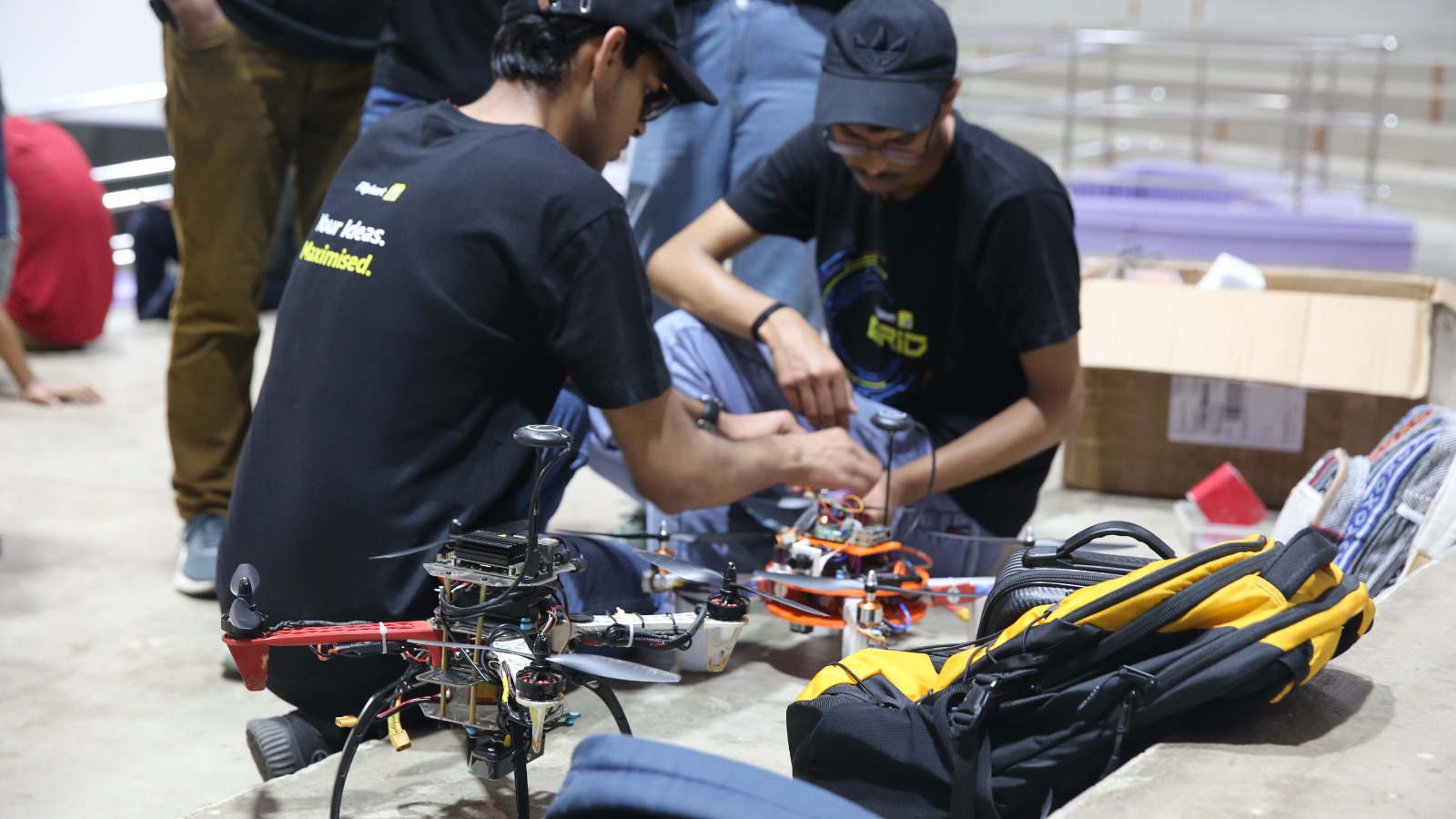This is the address delivered by Prof. Bhaskar Ramamurthy, Director – IIT Madras to the gathering assembled at 70th Independence Day celebrations. He quotes Mahatma Gandhi to urge us to avoid littering in our hostels, labs and residence. Also find few moments captured from the celebrations.

Fellow Indians and friends,
My greetings to all those assembled here on this the 70th Independence Day of our beloved country!
When we humans reach our seventieth birthday, our bodies show signs of wear and tear, and our matrix of what matters to us, and what doesn’t, undergoes changes. Consequently, we take stock of what we want to do with our time and change our priorities accordingly. For a land as old as ours, but a nation that is still young as it enters its eighth decade, it is a time to take stock too, but of how we have fared and whether some things need urgent attention.
There are many experts who will tell us what should not have been, what ought to have been, and so on, in these seventy years, and I commend their work to you. My attention today is focused on a seemingly simple matter, which was brought to our attention even before Independence. However, we are still struggling to get it right.

Gandhiji told us “sanitation is more important than political independence”. He also stressed that the first task of village development is ensuring cleanliness. Having lived prior to the era of plastics, his exhortations regarding cleanliness were mostly limited to sanitation and personal habits.
On October 2nd 2014, the Prime Minister launched the Swachh Bharat Abhiyan, a movement to achieve a measure of cleanliness across the country before the Mahatma’s 150th birthday in 2019. Let us spend a few minutes today reflecting on what we need to do in our little “village” – our campus – which we all so claim to love.
About a decade ago, I was tasked by the then Director to escort a world-renowned expert on Quality Management and Leadership, Prof. Shoji Shiba, who was visiting us. After freshening up in the Guest House, he set out to visit one of our departments. As soon as we entered the building, he asked to be taken to the toilet. I was somewhat surprised since we had just left his room in the Guest House. Sensing my curiosity, he told me that the condition of the toilet tells him a lot about any new place he visits. My own experience ever since has only served to reinforce his statement.
Our sanitation problems are not as fundamental as those of our compatriots in our villages. However, it is still safe to say that one does not need signage on many occasions to find our way to the toilets in the departments and hostels. Our noses will do just as well. We still have to get the maintenance of our toilet infrastructure up to the mark, and iron out the wrinkles in the housekeeping schedules and processes, to ensure that our toilets are clean, airy and welcoming at all times. We have got to first base, to use a sporting analogy, but we also need to improve our habits as users so that the toilets are squeaky clean at all times.

A bigger problem for us is waste, garbage and debris in the academic, residential and hostel zones. The protagonists in this story are all highly educated – we have no excuse whatsoever for conducting ourselves collectively the way we do. Faculty who choose to dump broken furniture or e-waste in the corridor, preferably outside the laboratory of a colleague, research scholars and technical staff who discard waste chemical containers and other lab-table scrap in the grass outside their laboratory or on the so-called “back sides” of our buildings, Engineering Unit staff who choose to be oblivious to the dumping of construction debris by contractors anywhere and everywhere, students and residents who litter the precincts of the hostels and residential areas with paper, plastic and worse – we are all complicit.
The presence of plastic in our waste makes matters much worse than in Gandhiji’s time. The Prime Minister recently referred to the problem of ingestion of plastic by cows. We have the same problem on our campus, except it is the deer that suffer here. We need to be particularly careful with plastic litter, especially plastic with food waste in it. It is not enough for us to clean up regularly – we need to avoid littering in the first place. Yes, we do have challenges in providing disposal bins that are monkey-proof, but these can be overcome once we understand the gravity of the situation and co-operate.

In the last two years, we have had several rounds of cleaning and clearing to remove waste from our academic buildings and hostels, to remove debris from the surroundings, and to arrange for proper disposal of chemical, biological and electronic waste. This is to be commended, and I request everyone to persist with these periodic exercises. Just think of all the material that flows into this campus, when viewed as a closed system, as a result of the substantial funds that flow in annually. Any system engineer worth his salt will tell you that if we do not clear our waste too at least annually, we will drown in it.
However, I urge all of us to take up the challenge in this 70th year of our independence to turn to a new way of living and working, where we dispose of our waste properly every day of our lives and not just in fits and starts. This means departments must routinely collect metal and wood scrap, chemical, biological, electronic and paper waste in a segregated manner, and dispose of these before they build up substantially in volume. Our administration must set up the processes by which the waste can be disposed of from their points of accumulation as per the prescribed procedures without hurdles. Engineering Unit must enforce foolproof procedures for contractors to accumulate waste at the designated dumpsites, and clear these as often as required. Hostel management must constantly monitor the catering contractors for compliance with waste disposal norms.
All of this can be done, if only each one of us chooses to pay some attention to it. Processes for proper waste and debris collection and disposal have been set up. They have been exercised as well to test for basic functioning. While several improvements are possible, we will discover them only if we plunge into this activity with some sustained commitment. We need faculty to be unwilling to permit dumping of disused lab furniture or packing material in the corridors. We need scholars and staff who would rather pester the administration if they are unable to dispose the waste to their satisfaction than take the easy way out and leave it outside the lab door. We need Engineering Unit to make the yet-unresolved aspect of our construction and maintenance activities, namely prompt and proper disposal of C&D and electrical waste, a key objective for the coming year. We need students to decide that the corridors and surroundings of their hostels will no more be a medley of discarded personal items, and plastic, paper or electronic waste.
As for plastic waste, we simply cannot litter. Period. If a convenient bin is missing, we must feel responsible enough to carry it to the next available bin for disposal, howsoever cumbersome it may be. If we visit the temples on campus, we simply cannot throw plastic waste in its precincts. The administration will continue to strive to improve our outdoor waste disposal infrastructure, which is made difficult by the presence of monkeys. However, we cannot wait for the perfect system to arrive before we improve our ways. Of course, if we segregate the waste better than we are doing at present, we will be doing a great service, but that is the next stop on our journey. We have to first get our basics right.
Many visitors to our campus are taken in by its beauty and serenity. Our roads, buildings and toilets are cleaned often enough that we do present a reasonable picture to the casual visitor. However, we know that we have some distance to cover before our surroundings truly speak to what we wish to be – a campus in pursuit of excellence in everything we do. It is easy enough to achieve this, even within a year. It only requires each one of us to resolve that we will not give into the temptation to litter or dispose waste and debris anywhere and everywhere, but take ownership for our surroundings.
If we choose to do this, I believe we would prove ourselves to be worthy citizens of this great and ancient land.
Jai Hind!




